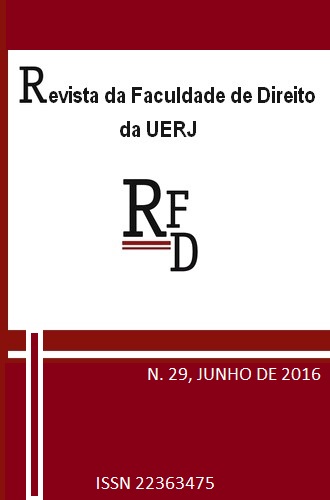MEIO AMBIENTE DE TRABALHO E OS PRINCÍPIOS DO THE TRIPLE BOTTON LINE: A INEVITABILIDADE DE MODERNIZAÇÃO DA LEGISLAÇÃO PARA MANUTENÇÃO DA ORDEM ECONÔMICA
DOI:
https://doi.org/10.12957/rfd.2016.12221Palavras-chave:
Dignidade. Meio Ambiente de Trabalho. Sustentabilidade.Resumo
O objetivo desse texto foi tratar o direito ao meio ambiente ecologicamente equilibrado, em especial o meio ambiente de trabalho. Para isso apresentou-se o conceito sobre o assunto, suas natureza jurídica e a importância de se ter um meio ambiente de trabalho salubre, limpo, agradável, confortável e divertido, sendo confundido com práticas de lazer. Tratou-se da Constituição Federal, artigo 225, que preserva este direito, e do artigo 170, da mesma legislação, declarando que o trabalho humano e digno são princípios fundamentas para a manutenção da ordem econômica brasileira, concluindo que o meio ambiente de trabalho, que preserve a saúde mental e física do trabalhador e possibilite que o mesmo possua qualidade de vida, colaboram para a efetivação destes norteadores. Também, verificou-se que a legislação tende a acompanhar o desenvolvimento social, modernizando-se, sob pena de não considerar aspectos essenciais para que se cumpra o preconizado na Magna Carta. Concluiu-se que, para a manutenção da ordem econômica e o trabalho digno, deve se considerar o Tripé da Sustentabilidade que destaca a interdependência de elementos econômicos, sociais e ambientais. Para o desenvolvimento da pesquisa, utilizou-se do método Aprendizado Centrado em Problemas, em que foram analisados os tópicos de aprendizado e são identificados a partir da apresentação de um problema real ou simulado. Frente ao problema, desenvolvem-se meios para solucioná-lo e, neste processo, identificam lacunas em seu conhecimento, buscando preenchê-las, com o auxílio de recursos instrucionais disponíveis.
DOI: 10.12957/rfd.2016.12221
Downloads
Publicado
Como Citar
Edição
Seção
Licença
Direitos Autorais
oArtigos publicados na Revista da Faculdade de Direito da UERJ (RFD/UERJ)
Os Direitos autorais dos artigos publicados pertencem à Revista da Faculdade de Direito da UERJ (RFD/UERJ). É permitida a reprodução total ou parcial dos artigos desde que citada a fonte.
oReprodução parcial de outras publicações
Artigos submetidos que contiverem partes de texto extraídas de outras publicações deverão obedecer aos limites especificados para garantir originalidade do trabalho submetido. Plágio em todas as suas formas constitui comportamento antiético e é inaceitável.
Recomenda-se evitar a reprodução de tabelas e ilustrações, extraídas de outras publicações. O artigo que contiver reprodução de uma ou mais tabelas e/ou ilustrações de outras publicações só será encaminhado para análise se vier acompanhado de permissão escrita do detentor do direito autoral do trabalho original para a reprodução especificada na Revista da Faculdade de Direito da UERJ (RFD/UERJ). A permissão deve ser endereçada ao autor do trabalho submetido. Em nenhuma circunstância a Revista da Faculdade de Direito da UERJ (RFD/UERJ) e os autores dos trabalhos publicados nesta revista repassarão direitos assim obtidos.
·Os trabalhos não aceitos para a publicação serão devolvidos aos autores, se solicitado.
A Revista da Faculdade de Direito está licenciada com uma Licença Creative Commons Atribuição 4.0 Internacional.
Este trabalho está licenciado sob uma Licença Creative Commons 4.0, Atribuição-Sem Derivações.
Esta licença permite copiar e redistribuir o material em qualquer suporte ou format para qualquer fim, mesmo que comercial, desde de que citada a autoria original.











